Renée Zellweger returns from the wilderness with a performance of awe-striking confidence and emotion.
Hollywood isn’t a real place. It’s a mirage. A land of make- believe that exists beyond the clouds. Movies are frivolous entertainments, but they’re also billboard advertisements for an Oz-like Arcadia of saturated Technicolor hues and cloying big band melodies. We’re sold the impression of Hollywood as a nirvana, and if you’re able to break inside, then all your positive (or saleable) human traits will be asset-stripped then amplified across the land, and possibly beyond. Yet supping from the poison chalice of stardom – or having it foisted upon you by an overbearing parent – can come at a deadly cost.
Judy Garland found this out the hard way. As the biographies have it, she became the star attraction of her family’s travelling vaudeville revue by accident. At the end of a set she would toddle onto the stage and belt out a tune that would instantly relegate her older siblings to the status of rank amateur. Her mother became fixated with the notion that the prodigal daughter, then named Frances Gumm, possessed a unique asset that others wanted and would pay dearly for. This girl was a natural born entertainer, in possession of a set of pipes that set her apart from the braying rabble. The dream of Hollywood was there for the taking, and she grabbed it, even if her hand was forced.
Rupert Goold’s heartbreaking historical drama (I don’t want to sully it by calling it a biopic), Judy, transports the viewer to the other, darker side of the rainbow, to Garland’s woebegone twilight years as a cash-in-hand cabaret chanteuse dressed in what looks like reconstituted curtain ends. Her name is mud within the Hollywood firmament, mostly down to what the gossip mags would chalk up as diva-ish tendencies (and more), plus the movie musical – her forte – has gone the way of the woolly mammoth.
We meet her at the point when she’s been tossed out of her hotel and skid row beckons. It’s strange to be confronted with the reality that one of the ritziest stars of the 20th century was, by her mid-forties, being put out to pasture. What’s even stranger is that Goold and screenwriter Tom Edge are not showing us this as a way to land a pin in the timeline then load up the jukebox and whisk us back through the glory years. No, Judy is more of a considered, carefully focused film which hones in on a relatively low-key, albeit representative and dramatically rich segment of Garland’s later career.
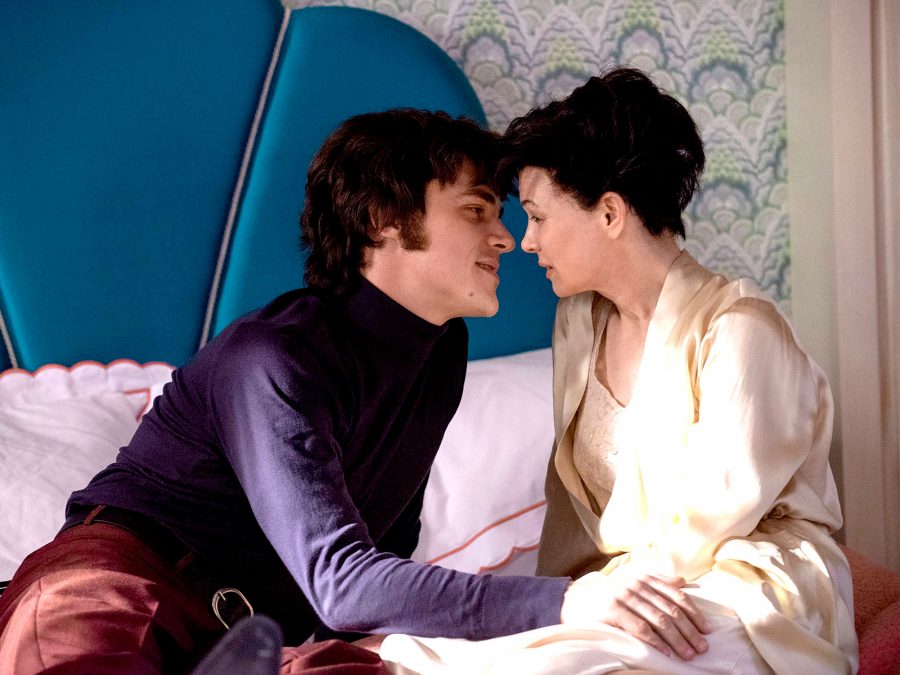
The plot covers her fulfilment of a 1968 commission to perform nightly at London’s Talk of the Town dinner theatre, an invite accepted as an only alternative to imminent penury. It also means sucking up the agony of being separated from her two young children for god knows how long. She sings, she wows, she drinks, she smokes, she stumbles, she marries, she has a night-cap with a pair of gay fans, and then, the lights go down. The applause fades. Silence.
The opening 30 minutes of the film focus solely on Judy’s messy private life, her divorce from Sid Luft (Rufus Sewell) and the bind she finds herself in with regard to needing fast cash to be able to retain custody of her kids. Everything about her is shambolic, yet her impulses are fuelled by an honest desire to love and be loved.
She arrives in London like a minor royal who’s been at the sherry, applauded by a phalanx of superfans and heading into a sold-out opening night. She skips rehearsals because she doesn’t need them. There is no discussion to be had. Jessie Buckley’s Rosalyn Wilder is saddled with the task of making sure she’s on time and sober (enough) to sing. It’s a build-up of dread and discord, which is instantly diffused by the opening bars of ‘Rain or Shine’, which she delivers as if it was the last song of the last night of the last tour of her life.
Along the way, the occasional flashback depicts teenage Judy (Darci Shaw) on the set of The Wizard of Oz, being bullied by the cigar-chomping MGM studio honcho, Louis B Mayer. He is a human oak, and his monstrousness is concealed underneath the grim logic of his faux-rootsy lectures, which are in fact passive-aggressive castigations delivered in a never-wavering baritone to a young, impressionable girl who never had a chance. One shot in which he caresses the cross on Judy’s chest as she drips water following an impromptu swim in the studio plunge pool suggests deeper abuse.
In the main role, as adult Judy, is Renée Zellweger, who exhumes the spirit of this fallen idol with ramshackle elegance. There is no two-bit mimicry here, no over-rehearsed tics or obviously detectible plummy accent. Both Zellweger and Goold understand that overzealous imitation in this type of film only serves to drive a wedge between audience and material. The ten-a-penny peacock turns by up-for-it chancers doing their best filmed karaoke so often drains a movie of nuance and credibility, as all the focus is placed on, what is, a pageant of paid-for narcissism.
Renée Zellweger: ‘There was a moment where I didn’t recognise myself’Here, Zellweger slinks into the story. She allows herself to be enveloped by elaborate and diffuse emotions. She understands that garish showboating is not necessary to make this intensely sad film meet its true potential. It’s a towering, shattering, hot-cold-hot performance from an actor in total control of body and mind. She is completely comfortable inside the skin of an icon. If there is a downside, it is that she does show up the supporting cast, who are right to cower in her wake. There are hints of Gloria Swanson’s fallen grande dame, Norma Desmond, from Billy Wilder’s Sunset Blvd., albeit with none of the entitled mania and all of that sense of a luminary lost in time.
Another aspect of this extraordinary performance is how Zellweger wrestles with Garland’s life up to this point, but never succumbs to signposting the tragic fate that awaits her the following year, in 1969. A TV interview sees Garland bombarded with intrusive questions about her past, and Zellweger teases the barely-suppressed anger without ever showing it. She makes light of Mayer’s malevolence and the effect it had on her with disarming loucheness, presenting her professional bondage as just another day on the farm.
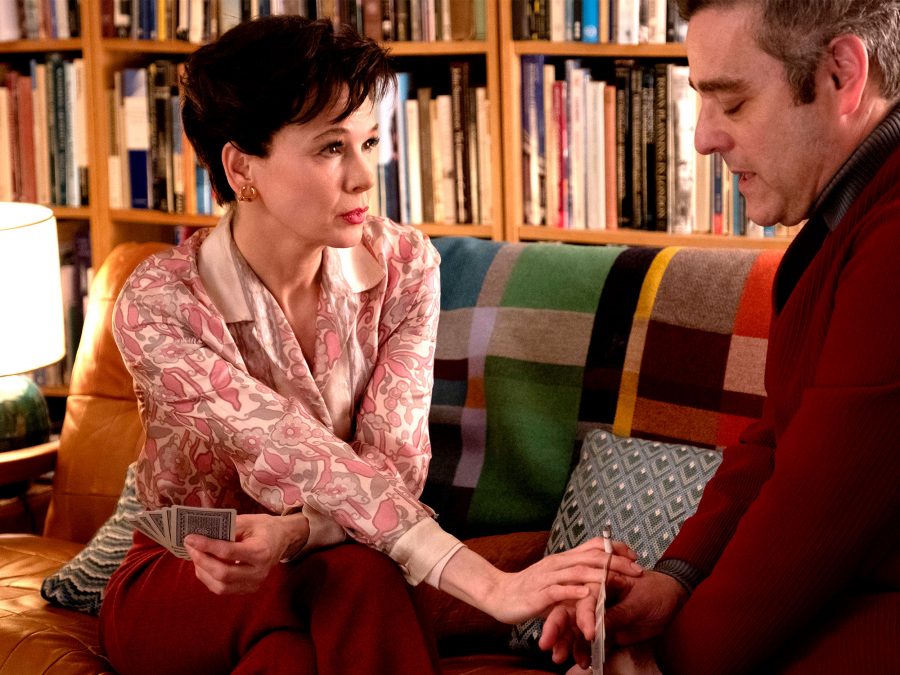
The studio audience chuckles, and so does she. The tragic core of the film is the idea that people have no real perspective on their own suffering. It’s about when abuse becomes ambient or normalised – you make it so much harder for yourself to detect the agony. In once scene she visits a doctor and is almost amused by the fact that he could even begin to comprehend, let alone fix, her pain.
Yet Garland became an emotional punchbag precisely because others wanted to milk profits from her abilities. There was never a Hollywood dream, it was always a nightmare, despite what she was told from those in her orbit. The film explores the idea of this type of special talent as being something that is inherent to us – as part of who we are. There’s a montage sequence of Judy charging confidently through her songbook, and from some angles it looks as if she’s performing through sheer muscle memory. Zellweger not only performs the songs well, but she performs them in a way that actually looks like this is the 1,000th time they’ve been sung – an ultra-dry cocktail of confidence and listlessness.
It’s a fascinating look at a woman who is too depressed to be depressed, steamrollered by a lifestyle that has never allowed for normalcy. Her body has been honed for Hollywood, and she’s unable to convert it back, to use it for family matters and relaxation. It’s not a maudlin film, but a very sad one – chiefly down to Judy’s eternal optimism and good humour in the face of so much tough luck. It’s about the shackles of fame, but it also looks at how good art, the stuff that is remembered, can strike a profound connection with an audience. Art, also, is a shrine in its own right. When the body dies, the art lives on. The mournful final scene captures this sentiment beautifully.
Published 28 Sep 2019
This prestige celebrity bio isn’t really my cup of tea, but here for a big, brassy star turn.
Zellweger’s performance is of a calibre usually expected from a Day-Lewis or a Streep.
A music biog that transcends its subject matter. An old school tragedy deserving of the name.
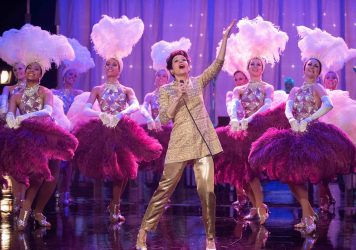
The Judy Garland biopic focuses on her 1969 London residency.
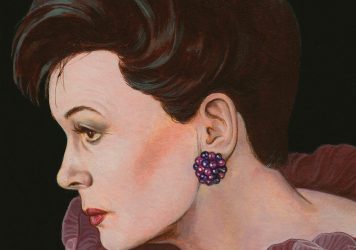
Our latest issue pays tribute to an icon of Hollywood, as played by Renée Zellweger in Rupert Goold’s beautiful new biopic.
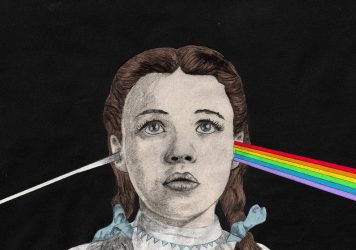
By Thomas Hobbs
I was skeptical about pairing The Wizard of Oz and Pink Floyd, until I decided to put the fan theory to the test...